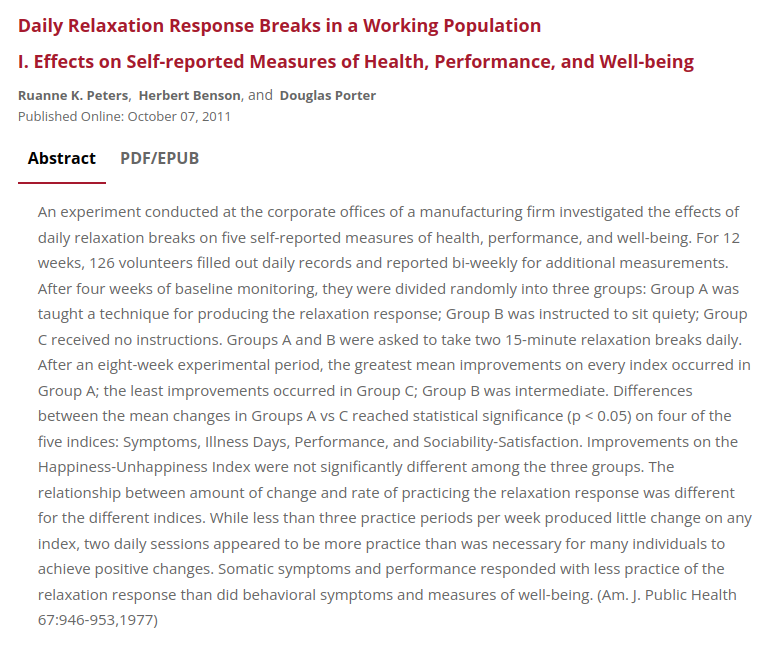An experiment conducted at the corporate offices of a manufacturing firm investigated the effects of daily relaxation breaks on five self-reported measures of health, performance, and well-being. For 12 weeks, 126 volunteers filled out daily records and reported bi-weekly for additional measurements. After four weeks of baseline monitoring, they were divided randomly into three groups: Group A was taught a technique for producing the relaxation response; Group B was instructed to sit quiety; Group C received no instructions. Groups A and B were asked to take two 15-minute relaxation breaks daily. After an eight-week experimental period, the greatest mean improvements on every index occurred in Group A; the least improvements occurred in Group C; Group B was intermediate. Differences between the mean changes in Groups A vs C reached statistical significance (p < 0.05) on four of the five indices: Symptoms, Illness Days, Performance, and Sociability-Satisfaction. Improvements on the Happiness-Unhappiness Index were not significantly different among the three groups. The relationship between amount of change and rate of practicing the relaxation response was different for the different indices. While less than three practice periods per week produced little change on any index, two daily sessions appeared to be more practice than was necessary for many individuals to achieve positive changes. Somatic symptoms and performance responded with less practice of the relaxation response than did behavioral symptoms and measures of well-being.
Daily Relaxation Response Breaks in a Working Population I. Effects on Self-reported Measures of Health, Performance, and Well-being
Publication
Am. J. Public Health
67:946-953
Abstract
Web and Email Links
Related Listings
Journal
J Occup Med
The efficacy of meditation-relaxation techniques has been widely researched in the laboratory, but their effectiveness for management of stress in organizational settings is still relatively unexplored. The present study compared relaxation and control conditions as part of a program of stress-reduction in industry. A total of 154 New York Telephone employees self-selected for stress learned one of three techniques--clinically standardized meditation (CSM), respiratory one method medi […]
Journal
Developmental Medicine and Child Neurology
To assess the efficacy of electromyographic biofeedback, relaxation-response training and pain behavior management as a treatment for pediatric migraine, we studied 18 children between the ages of eight and 12 years (mean = 10 X 1) in a prospective, randomized, controlled investigation. Six patients received all three treatment procedures, six received relaxation-response training and pain behavior management, and the remaining six constituted a waiting-list control group. All patient […]
Journal
Scientific American
A very readable introduction to the scientific findings in neurology about primarily Buddhist forms of meditation.

